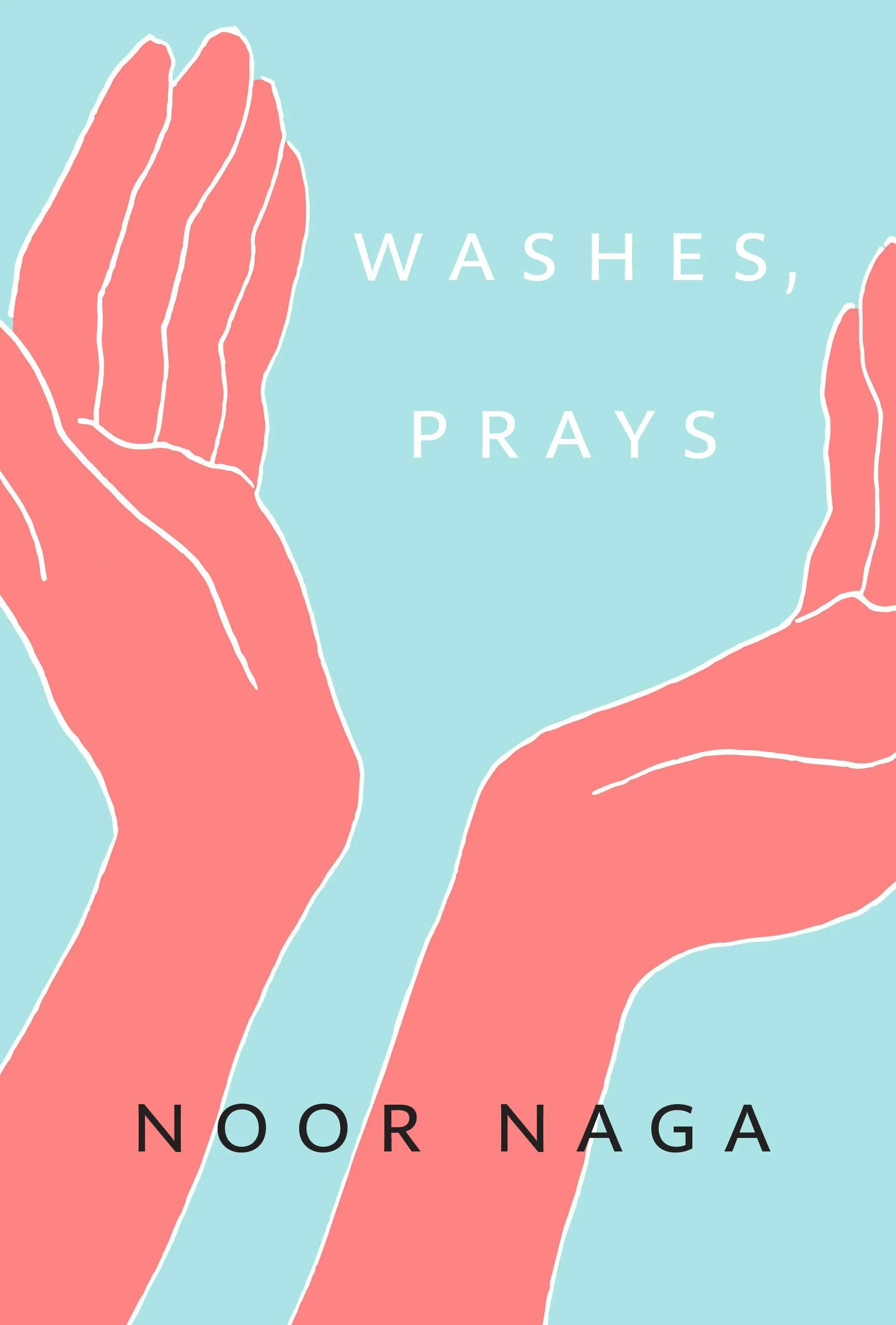An Animal Left on her Lover’s Doorstop: Review of Noor Naga’s Washes, Prays
Noor Naga, Washes, Prays.
McClelland & Stewart, 2020. $19.95 CAD
Order a copy from McClelland & Stewart.
Noor Naga’s Washes, Prays is a novel in verse. Centred around the affair Khadija, nicknamed Coocoo, has with her married professor, Mohammad, the novel’s themes extend beyond the affair. Interweaving and layering the narrative with questions about religion, morality, philosophy, commitment, and the difference between free will and God created destiny, Washes, Prays immerses the reader in an experience far beyond that of a linear narrative, using poetry’s ability to create layered meaning through disparate images to complicate the prose. She further complicates the linear narrative by breaking from prose poetry to tell the story from Nouf’s perspective through quatrains in the second and middle section of the book.
The novel begins by plunging the reader into Coocoo’s guilt and her understanding that she has strayed far from God’s path. She says, “the damning appendage is the finger pointed at the sky saying I/deserve more than You’re giving me/I am hungry when I shouldn’t be'' (2). Hunger becomes synonymous with desire as Coocoo questions her desires to fill the emptiness in her, with love, with sex, with friendship, with anything but herself. She is empty and she feels guilty for not being satisfied with what God has given her. And yet, she also questions destiny and God’s will, wondering whether someone’s actions can be judged if everything that happens in the world is God’s will. Washes, Prays is a story of self-discovery, of finding one’s path, and Coocoo moves through the book trying to figure out her relationship to morality. Is anything bad if it is created by God? Nevertheless, the novel is not interested in creating a moral code. It is more concerned with questioning everything, from religion to love, than with providing answers.
The book also provides levity and pleasure through its humour. Juxtaposing melodrama and humour, Naga allows a story about infidelity to become much more. When Coocoo is at her lowest, she can still make a joke at her own expense, providing a moment of reprieve from the darkness and seriousness of Coocoo’s thoughts. She laughs at herself, saying “hello hello please hi my name is extraneous extramarital extra” (8).
Naga’s skill with language and her blend of poetry and prose also gives Washes, Prays a layered effect. The book never feels straightforward or easy; it is steeped in multiplicity, allowing Naga to address the complex themes of the book. She does so at the level of each individual line. She uses parentheses in clever ways, in order to infuse not afterthought, but rather that which is ever present (the wife). When Coocoo first finds out about Muhammad’s wife, she says, “the word most commonly used in the qur’an to describe a tragedy or calamity (should be wife)/is musiba from the root a-s-b meaning to hit a target or correctly/hit a target” (14). Coocoo layers meaning in this sentence, explaining both the meaning of tragedy, and demonstrating the target that hits her, the word “wife”, a tragedy. The whole page is a sinking into this new knowledge. “I try not to say if I eat too many dry foods I have dreams of (your wife) accidentally drowning” (46). Later on, after having sex in the hotel, Coocoo starts trying to place her mark on him, and yet, once again, the wife appears in parentheses. “When he didn’t wake up I shouted assert my yourness!/while he was sleeping I tied one of my pubic hairs around his incisor I tied it with a tiny bow like a tiny gift (for his wife)” (21). Even when trying to assert ownership over Muhammad, this ownership is always in relation to his wife.
Washes, Prays also deftly utilizes an extended metaphor throughout the book. Coocoo becomes a dog, or dog-like, in her desperation and her obsession with her lover who becomes more and more distant. In some Islamic teachings, the dog is seen as impure. Naga uses this trope of the impure dog to demonstrate the impurity Coocoo feels. She is dirty and degraded like a dog, and in the end is unwanted. The “other woman,” always not wife, becomes synonymous with this impurity with the imagery of the dog. Desperate at the end of the book,, Coocoo decides to go to Muhammad’s house and becomes an animal left on her lover’s doorstop, shooed away, and driven from the house. She explains “I sniff the doorknob then lick it put my head to the ground and peer through the slit when I am dog-tired all of a sudden/the wind has teeth and in its mouth I want to sleep and sleep” (60). The novel ends with a “dying animal [...] retreat[ing] into the woods alone,” ready to die, or be reborn, other, and without the lover. Naga maintains this metaphor right until the end, and while the metaphor could easily have felt overdone, it never reaches that point, Coocoo’s/the dog’s desperation always feels so potent and visually tangible.
The skill of Washes, Prays, an extraordinary debut, is Naga’s deft use of language, her skill and agility with words amplifying the common affair story. With dry and playful humour, Coocoo’s voice is unique and makes a book that contends so much with religion and morality anything but a boring sermon.
Eli Tareq El Bechelany-Lynch is a queer Arab poet living in Tio’tia:ke, unceded Kanien’kehá:ka territory. Their work has appeared in The Best Canadian Poetry 2018 anthology, GUTS, Carte Blanche, the Shade Journal, The New Quarterly, Arc Poetry Magazine, and elsewhere. They were longlisted for the CBC poetry prize in 2019. You can find them on Instagram and Twitter @theonlyelitareq. Their book, knot body, was published by Metatron Press in September 2020, and their upcoming book, The Good Arabs, will be published by Metonymy Press in 2021.


